Today is the first anniversary of one of the most important people in my life: my mother's only sister, Mary McCann, the oldest of the six children in the Paige family.
Everybody should have an Aunt Mary in his life. Aunt Mary was the person who would walk into a room, and faces all over it would light up: "Mary's here!" Instant party! No matter what the subject, she always had a tart, and extremely funny, rejoinder (none of which, naturally, I can recall at the moment). After World War II, when housing was so tight, a succession of relatives lived with her and her family, often for a year or two. Her house was shabby, and never very well furnished, but that never seemed to matter: The meals she turned out were masterpieces, not of haute cuisine, but of down-home cooking. Anyone who thinks that Irish cooking is bland and tasteless, never ate one of Aunt Mary's pot roasts. Nearly all of my fondest memories of her home take place in either the dining room or the tiny kitchenette.
Speaking of Irish, she was fiercely Irish and fiercely Catholic. The fact that her husband was a Scot was explained, "The family was really Irish, but they had to live in Glasgow." (Not according to my uncle.) The fact that one of her grandmothers had been (gasp) German, was simply never mentioned. She attended Mass daily, but she wasn't one of those Sweet, Genteel Irish Ladies, not by a long shot. If there was a battle to be engaged, her head would rise up and her eyes would flash; you could tell she was enjoying every second of the conflict.
She was, according to herself, one of the first feminists, and that's probably true: She worked all the years I knew her, and in the 1950s and 1960s, it was highly unusual for a woman to work outside the home who wasn't a widow. She was the mainstay of the New York State American Legion -- organized all their conventions for nearly forty years, kept all the statistics in her head, did all the bookkeeping, and did it all on a part-time basis: She only worked 9:00-3:00. My mother watched her two sons between the time school let out, and the time their mother came to collect them, usually around 4:00 (the train from Manhattan to our part of Queens took 45 minutes, then there was a bus ride and a longish walk to our house).
There were downsides to her life. Her mother died when she was eleven years old, and the only other person in the house to oversee its care and upkeep was a 67-year-old grandmother. Consequently, she spent far too much of her childhood working and trying to chivvy her brothers and sister into doing their fair share of housework (I have the impression she was never successful at that). Her marriage was forged in World War II, and I'm not referring to the date. She was married for over 40 years, and of them, maybe the first three were somewhat happy: Two people who grew up motherless are not a match made in heaven. She was a shocking housekeeper: While her house was always clean, it was never tidy, and considering that my family consisted of seven people in four rooms, while hers consisted of four people in a six-room house, that's not a very high standard of tidiness on my part. Housekeeping wasn't her thing; numbers were. She had the house paid off in ten years, and how many of us can say that, these days?
Towards the end of her life, it all told. After retirement, she had literally nothing with which to occupy herself, and as she turned inward, she became suspicious of nearly everyone in her life. The last two years of her life, she lived in New Hampshire, where two nieces and a nephew could keep an eye on her; of her two sons, one had moved to the West Coast, and the other was someone she just couldn't get along with. She was not happy about that move, and let us all know it, every day. Eventually we had her evaluated by a social worker; it was clear that she could stand to live in an assisted living facility, since she made a habit of calling on people for help in the wee hours of the morning, and didn't always know where she was. At one point, the social worker asked if she had any living brothers or sisters, and Aunt Mary replied, "One brother." Since I knew what the social worker was getting at -- a brother's wishes for her care would always be considered over nieces and nephews -- I quickly noted that her one surviving brother was an alcoholic, and not really capable of informed judgement. After the social worker left, Aunt Mary turned on me: "Uncle Richie is not an alcoholic, and how you could say such a thing to a complete stranger is beyond me." Characteristic of the Irish: Let's not admit that there are Problems in the family, What Will the Neighbors Think.
Yet her death was peaceful -- and typical: She had hung on all day, although we all knew the end was near, and we couldn't figure out why. Around 3:00 p.m., to our surprise, my nephew Richard showed up, and we all turned to him with exclamations of, "Rich, hi!" with evident surprise in our voices -- and she expired. Not five minutes later, her brother, also Richard, called to say hello to her (he lives in Tennessee), and we had to break the news to him that she was gone. We thought that perhaps she had been holding on until her brother could arrive, and when we all exclaimed, "Rich!" she thought it was her brother. Then her oldest son, with his mother's characteristic sharp wit, added, "Unless she knew he was going to call, and she didn't want to talk to him."
She was brought back to her hometown for burial, and buried from the church where she had been baptized and married. When I think of her, I always have the two Aunt Marys in mind, the one I always knew and admired, and the shrivelled, suspicious old lady she had become. In retrospect, I wish I had never met that old lady; the other memories are the better ones.
Saturday, March 18, 2006
Subscribe to:
Post Comments (Atom)
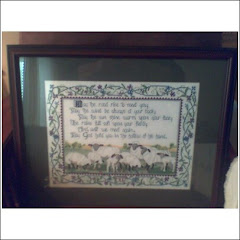
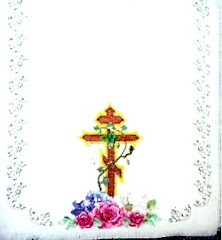
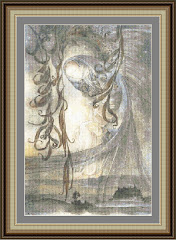
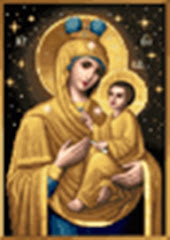
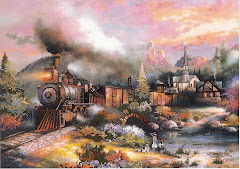
1 comment:
May her Memory be Eternal.
Post a Comment